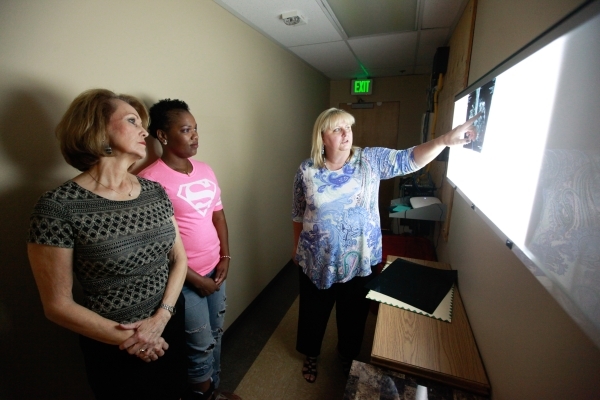Young mother’s unusual breast cancer required swift action
It's a monster, Carolyn Whitney explained, a very bad monster inside her body. And, to get rid of it, Whitney would have to take medicine that might chase her hair away, because it, too, was afraid of the monster.
Logan, Whitney's 5-year-old daughter, accepted her mom's explanation. But that didn't make the real demon inside Whitney any less scary.
Breast cancer. A fast-appearing, quick-growing breast cancer that struck Whitney when she was 25 years old, an age when the occurrence of breast cancer is relatively rare.
With the diagnosis came considerations that are, if not unique, at least more predominant in young women. How a mastectomy would alter Whitney's appearance. Whether Whitney would live to see her daughter grow up, graduate from high school and get married someday. How radiation, chemotherapy and continuing post-surgical treatment might affect Whitney's ability to have another child.
Now, more than a year after her initial diagnosis, Whitney is doing well. But she concedes that learning that she had breast cancer raised issues that she hadn't expected to consider for many years, if ever.
Self-exam discovery
Whitney first noticed a lump in her right breast during a self-exam in May 2014. It was "about the size of a quarter, and hard, like a pencil eraser," she says.
It "grew very fast," Whitney adds, and even her OB-GYN, who had seen her just a few weeks beforehand, "didn't feel anything" then.
She called her OB-GYN the next morning and saw him again a few days later. "He said, 'Nine times out of 10, it's just a fatty mass that all young women get, because you're too young to have breast cancer. But I'll get you an ultrasound because you're concerned about it,' " Whitney recalls.
"It's true that we do see breast cancer in what we consider younger women, but that's normally late 30s and early 40s," says Dr. Heather Allen, Whitney's medical oncologist at Comprehensive Cancer Centers of Nevada. "It's very unusual to see it in a 25-year-old."
The ultrasound revealed a mass in Whitney's breast. Five weeks after noticing the lump, Whitney met with Dr. Margaret Terhar, a breast surgeon with Comprehensive Cancer Centers of Nevada.
"She said the same thing, 'It's most likely nothing,' " Whitney recalls. "She was like, 'It could just be a benign cyst you have, because you're too young to have developed breast cancer. This is out of your age category. But we're going to do a biopsy on it because the ultrasound did look abnormal.' "
And, Whitney says, "she confirmed it was cancer."
Whitney says the diagnosis surprised her. But, she says, "before I went to find out, I prayed, and I said, 'God, if this is what it's going to be, then I can't be all mad about it,' and I have to put my mind-set that, in this day and age, more people live after getting cancer than ... die from it. So I can't automatically assume I'm going to die because I have it."
'Whatever we need to do'
Whitney's tumor was classified as Stage 2. "I'd say 95 percent of people are going to be cured from Stage 2 cancer," Terhar says, although it also was "a fairly aggressive-type cancer," as cancers in younger patients tend to be.
Her treatment plan called for chemotherapy to shrink the tumor, followed by surgery and then radiation therapy. From the start, Whitney was intent on using every option available.
"I said to them, 'Whatever we need to do, so that at the end of this I don't even have to be 100 percent better but even 50 percent better.' Because I have a small child, I'm willing to do it. If I have to do chemotherapy, if I have to do radiation, if mastectomy is the best option, I will exhaust all the resources I can so that I can know I've tried anything that I could to be here."
Whitney started chemotherapy on July 1, 2014, a week before her 26th birthday. Whitney tried to explain to Logan what was happening to her in ways she thought her daughter could understand.
"I said, 'How would you feel if Mommy lost all her hair?' She said, 'You're still going to be beautiful to me, Mommy.' I said, 'Somewhere inside Mommy's body is, like, a yucky monster that's going to try to make me really sick, but doctors are going to give me medicine to make the monster go away, and it's going to make Mommy's hair be gone because it's scared of the yucky monster.' And that's what she told her friends."
Whitney also chronicled her experiences in a journal. "When she's old enough to really grasp and understand what happened, she'll be able to look back and see what Mommy looked like at the time," Whitney says.
Whitney underwent chemotherapy from July to October 2014. "It was horrible," she says. "It didn't really make me feel nauseous in that sense, but there's a term they have for, like, a chemical burn on the hands and feet. My hands, the skin looked like third-degree burns, that and the bottom and top of my feet. And I lost all of my fingernails and my toenails."
Concerns about younger patients
Treating breast cancer in younger patients raises concerns that don't necessarily exist in older patients. For example, as a young, working, single mother — at the time, Whitney worked for a mental health services provider — Whitney had to balance the rigors and time demands of her treatment with parenting and her job. Fortunately, she says, her mother and family members were able to help out on the home front.
Then, Allen says, "we know that the treatments we can do affect fertility, and for someone who's 25 years old, that might be a real issue."
In women younger than 45, "genetic testing issues come up, because in those women we often do have a mutation that caused them to get it at a younger age," Allen says. "As it turns out, Carolyn didn't have that, but it's another discussion we want to have with the patients that might be different than older patients."
Terhar notes, too, that women who are diagnosed with breast cancer in their 60s or 70s may be concerned about living long enough to see their children marry or to meet their grandchildren, while younger patients may face the more immediate need of planning for the care of their children if they're no longer around to care for them themselves.
Younger women also are more likely to face nonmedical issues relating to their stage of life. For example, Terhar says, "women of 25 are like, am I ever going to get a date again, or ever meet a man who can handle this, or am I going to graduate from college? These are the things you have to deal with when you're that age."
Preventive action
A month after her chemotherapy ended, on the day before Thanksgiving 2014, Whitney underwent a double mastectomy. It was her choice, made, Whitney explains, as "a preventive thing."
"Actually, the chemo worked really well. The tumor was completely gone and they could have done the lumpectomy," she says. However, she chose removal of the entire breasts in an effort to reduce, as much as possible, the chances of a recurrence.
From February to March of this year, Whitney underwent radiation therapy She now hopes to have breast reconstruction surgery in January. She's feeling well, although she concedes she's not yet completely back up to speed.
And Logan? "You would not even think it has affected her," Whitney says. "She's more, now, like it never happened."
As a young woman, Whitney — who says she's "dating but not married" — has thought about how her mastectomy might affect dating. But, she says, "I figured if the person that I end up with only loves me because of my breasts, then that's probably not the right one for me."
Doing great a year later
She also has thought about the possibility that her treatment — which includes taking estrogen suppressants for at least two to five years, and maybe for as long as 10 years — may leave her unable to have another child.
But, for now, Whitney is "doing great," Allen says. "She's now out over a year from her diagnosis.
"People always ask me, 'Am I cancer-free?' and my answer to that is, only time will tell. She's out over a year, but we'll feel better when she's out over five."
Whitney urges other women to, first, take control of their own health. In retrospect, she's happy that she chose to follow up on the lump she detected during her own self-exam.
"You can't take anything for granted," Whitney says. "Don't let someone talk you into not being concerned about your life."
Then, even if worse comes to worst, "stay positive," Whitney says. "The more negative you are, the worse this experience is going to be, and it's already a bad experience."
— Contact reporter John Przybys at jprzybys@reviewjournal.com or 702-383-0280 or follow @JJPrzybys on Twitter.






































